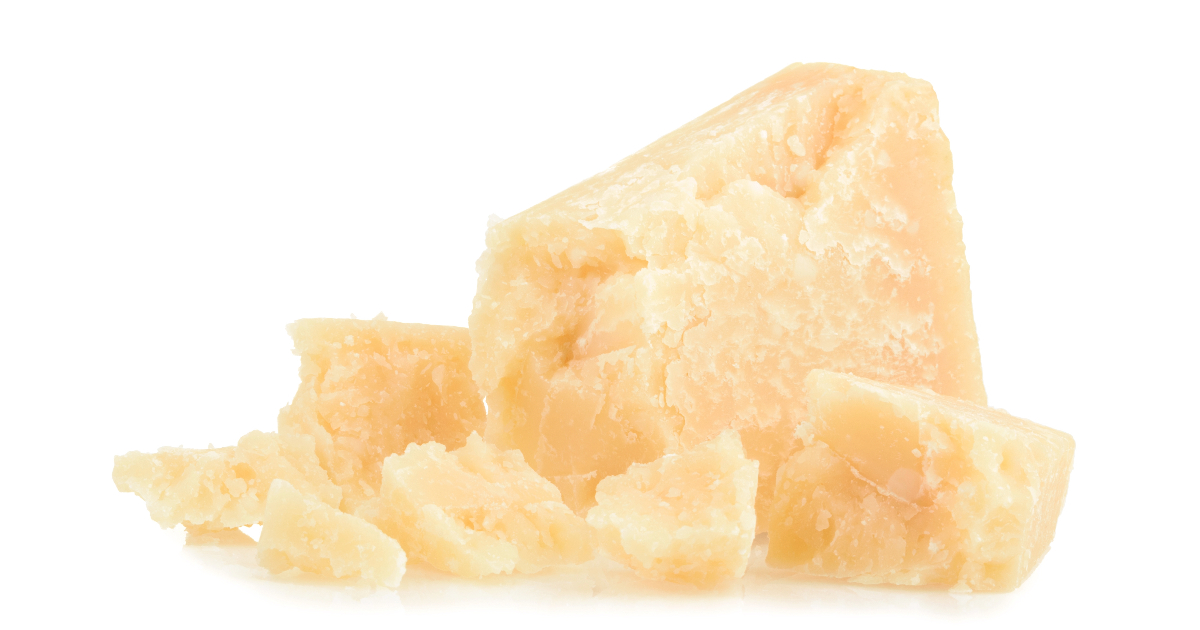Parmesan and Auribella are both hard Italian cheeses made from cow's milk.

They share some similarities but also have distinct differences in terms of flavor, texture, uses, origin and cost.
Overview of Auribella and Parmesan Cheeses
Auribella is a Italian cow's milk cheese made exclusively by the Wisconsin-based company BelGioioso. It was created to mimic the flavor and texture of Parmigiano Reggiano (authentic Parmesan cheese).
Parmesan refers to a hard, dry, granular cheese from Italy. To be called Parmesan, the cheese must be made in a specific region of Italy under strict guidelines. Parmigiano Reggiano is authentic, traditional Parmesan cheese with protected designation of origin status.
Both Auribella and Parmesan are semi-hard cheeses that become increasingly granular and pungent with age. They are excellent for grating and adding bold, salty flavor to recipes. However, there are some notable differences between them.
How Auribella and Parmesan Cheeses Are Made
Auribella Cheese Production
- Made exclusively by BelGioioso in Wisconsin, USA.
- Uses pasteurized cow's milk from local Wisconsin farms. The milk is rBST-free.
- The curds are heated, pressed, molded and brined to form wheels.
- Wheels are aged for a minimum of 6 months.
- Aged in special curing rooms at the BelGioioso facility.
Parmesan Cheese Production
- Must be produced in designated Parma and Reggio Emilia provinces of Italy.
- Uses raw, unpasteurized milk from cows fed a restricted diet.
- Milk is curdled using calf rennet and whey starter cultures.
- Curds are cooked and pressed in molds for 2 days.
- Wheels are soaked in brine for 20+ days to absorb salt.
- Aged for minimum of 12 months up to 3+ years.
- Aged in temperature and humidity controlled rooms.
The key differences in production are the origin, pasteurization, aging time and conditions. Parmesan has much stricter requirements for milk source, aging duration and environment.
Flavor Profiles: How They Taste
Auribella has a full, sharp and robust flavor. It is described by the maker as having a "big, bold" taste.
Notes of butter, salt and umami are detectable. The buttery note is attributed to the use of pasteurized milk. The minimum 6 month aging period produces a pleasant pungency.
Parmesan has a rich, complex flavor profile with sweet, salty and savory notes. It offers a depth and complexity not found in Auribella.
Its flavor evolves with age, becoming intensely savory, salty and tangy. Fruity and caramelized milk flavors emerge in longer aged varieties (18 months+).
Parmesan's flavor is more complex, while Auribella is sharper and bolder.
Texture and Appearance
Auribella has a firm, dense texture that is slightly crumbly when cut or grated. Its smooth, white interior and small protein crystals reflect its shorter aging time.
Parmesan is grainy with noticeable protein crystals. It becomes harder and more crumbly as it ages. Well-aged Parmesan (24+ months) is dry and granular making it perfect for grating.
Parmesan has a uniquely granular texture not replicable in Auribella.
Best Uses for Auribella and Parmesan
Thanks to its bold flavor, Auribella is excellent for:
- Grating onto pastas, pizzas, soups and salads
- Adding depth of flavor to sauces and dips
- Snacking on cheese boards with fruits and nuts
Parmesan's complex flavor and granular texture make it ideal for:
- Grating onto Italian dishes - pastas, risottos, polenta
- Adding rich, salty flavor to sauces - alfredo, pesto, tomato
- Snacking on chunks, wheels or grated over fruits
- Enhancing egg dishes like frittatas and omelets
Parmesan is considered the more versatile cheese perfect for both cooking and snacking. Auribella works best when its bold flavor can stand out.
Nutrition Comparison
Both cheeses are good sources of protein and calcium. However, Parmesan has slightly higher protein and calcium levels as shown below:
| Nutrient | Parmesan | Auribella |
|---|---|---|
| Calories | 111 per oz | 110 per oz |
| Protein | 10g per oz | 8g per oz |
| Calcium | 33% DV | 30% DV |
| Fat | 7g per oz | 8g per oz |
Parmesan offers more protein and calcium by weight while Auribella is higher in fat.
Origins and Availability
Auribella is produced exclusively in the United States by BelGioioso Cheese Company. It is available for purchase online and at some grocery retailers nationwide.
Parmesan is a protected designation of origin product only made in certain regions of Italy. It has limited availability outside of Europe. Authentic Parmigiano Reggiano is the hardest to find outside of Italy.
For most home cooks, Auribella will be the easier cheese to source thanks to its nationwide availability. Finding authentic, imported Parmesan can require searching specialty shops or online retailers.
Cost Comparison
Auribella is the more affordable option, costing $7-9 per pound on average. Its price is comparable to other domestic hard cheeses like Asiago or Gouda.
Genuine Parmigiano Reggiano costs $15-25 per pound on average. The price reflects the strict production requirements, imported status and limited availability outside Europe. Pre-grated "Parmesan" tend to cost less but lacks the same quality.
For budget-conscious shoppers, Auribella delivers the bold Parmesan-esque flavor at a fraction of the cost.
Key Takeaway: Auribella cheese is the affordable alternative providing a comparable flavor profile to real Parmesan.
Main Similarities Between Auribella and Parmesan
- Hard, aged cow's milk cheeses from Italy
- Salty, tangy, savory flavor
- Firm, dense texture good for grating
- Adds bold flavor when grated onto foods
- Excellent source of protein and calcium
Key Differences Between Auribella and Parmesan
- Auribella made in Wisconsin, Parmesan made in Italy
- Auribella aged 6+ months, Parmesan 12+ months
- Parmesan has more complex, nuanced flavor
- Parmesan's texture gets drier and more granular with age
- Parmesan has more protein and calcium by weight
- Auribella is more affordable and widely available
How to Substitute Auribella for Parmesan
Auribella makes an excellent substitute for Parmesan in recipes thanks to its similar bold, salty flavor. Here are some tips for using Auribella when Parmesan is called for:
- Use the same weight of Auribella to replace Parmesan (1 oz Auribella for 1 oz Parmesan)
- Add Auribella at the end of cooking to retain its flavor
- Because Auribella is sharper, start with 3/4 of the amount first
- For salads, pastas and pizzas, grate Auribella as you would Parmesan
- Auribella melts well so it can be substituted in casseroles or baked pastas
Common Uses for Auribella and Parmesan Cheeses
Pasta Dishes
Auribella and Parmesan both excel when grated over hot pasta. The residual heat helps release their flavors. Try them with simple pastas like spaghetti aglio e olio or fettuccine alfredo. The bold, salty flavors pair perfectly with these Italian noodle dishes.
Salads
Used in moderation, grated Auribella or Parmesan add a savory accent to fresh salads. Try a light dusting over Caesar salad, Caprese salad, or this simple arugula salad with lemon and pine nuts. The sharpness balances the greens and dressing.
Pizza
Auribella and Parmesan are pizza game-changers. Just a sprinkle over your favorite pizza adds a whole new dimension of flavor. The salty richness enhances pepperoni, veggie, or white pizza beautifully. Use less than you would for pasta, as the cheese can overwhelm other delicate pizza toppings.
Soups and Stews
Add Auribella or Parmesan just before serving creamy or brothy soups and stews. Parmesan is the traditional choice for minestrone or Italian wedding soup. But Auribella provides that same savory hit. Save back some of the cooking liquid, then stir in grated Auribella or Parmesan allowing it to melt into the soup.
Snacking
Enjoy both cheeses on a cheese board with breads, crackers, fruits like pears or apples, and cured meats. Parmesan pairs nicely with balsamic vinegar, fig jam, dried apricots, or honey. Auribella goes well with nuts, roasted grapes, or peppery salami. Parmesan's granular texture is best showcased when served in chunks or shaved.
Key Takeaway: Both cheeses shine when grated onto pastas, pizzas and salads, or served alongside cured meats, fruits and nuts. Parmesan is the more versatile ingredient for finishing soups and stews.
FAQs
Can you freeze Auribella cheese?
Yes, Auribella can be frozen in an airtight container for 4-6 months. Defrost in the refrigerator before using. Grated Auribella may become crumbly when thawed.
How long does Auribella cheese last?
Properly stored, Auribella lasts 2-3 months past the sell-by date when refrigerated. Check for mold before eating expired cheese.
Is Auribella cheaper than Parmesan?
Yes, Auribella typically costs 1/3 to 1/2 the price of authentic, imported Parmesan. It's an affordable alternative with a similar bold flavor.
Is Auribella or Parmesan better in alfredo sauce?
Both work well, but Parmesan offers more complexity. Use 3/4 the amount of Auribella to avoid it being too sharp. Add towards the end of cooking.
Can you use Auribella instead of Parmesan in pesto?
Absolutely. Auribella provides the same salty impact. You may wish to use less at first, as Auribella has a sharper flavor.
Is pre-grated Parmesan the same as fresh Parmesan?
No. Pre-grated Parmesan loses flavor and dries out quickly. Fresh Parmesan has better flavor and texture when grated just before use.
Conclusion
While Auribella and Parmesan share some traits, there are distinct differences that set them apart.
Parmesan offers unmatched complexity reflecting its artisanal Italian origins.
Auribella provides an affordable, widely available Parmesan-style cheese with a bold flavor all its own.

